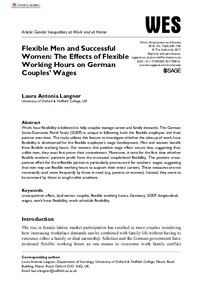Flexible men and successful women: the effects of flexible working hours on German couples' wages

2018
32
4
August
687-706
flexible working time ; wages ; dual career couple ; women ; gender equality
Human rights
https://doi.org/10.1177/0950017017708161
English
Bibliogr.;Statistics
"Work hour flexibility is believed to help couples manage career and family demands. The German Socio-Economic Panel Study (SOEP) is unique in following both the flexible employee and their partner over time. The study utilizes this feature to investigate whether the take-up of work hour flexibility is detrimental for the flexible employee's wage development. Men and women benefit from flexible working hours. For women, this positive wage effect occurs late, suggesting that, unlike men, they must first prove their commitment. Moreover, it tests for the first time whether flexible workers' partners profit from the increased couple-level flexibility. The positive cross-partner effect for the inflexible partner is particularly pronounced for mothers' wages, suggesting that men may use flexible working hours to support their wives' careers. These measures are not necessarily used more frequently by those in need (e.g. parents or women). Instead, they seem to be accessed by those in sought-after positions. "
Digital
The ETUI is co-funded by the European Union. Views and opinions expressed are however those of the author(s) only and do not necessarily reflect those of the European Union or the ETUI.